- Home
- Will Hobbs
Far North Page 6
Far North Read online
Page 6
That night I woke to the howling of wolves. I knew immediately that’s what they were. When my dad and I had heard the yipping and singing of coyotes out in Big Bend National Park along the Rio Grande, it had seemed an eerie curiosity. The howling of these wolves was deeper, more sustained, somber and ghostly. It distilled all my fears of the cold, the darkness, and the unknown, and I felt the hackles rising on the back of my neck. I was grateful we weren’t out in the open. I remembered how my dad had always wanted to see a wolf.
I lay back down. After a few minutes the wolves quit, but I couldn’t go back to sleep. Later I heard something snuffling around, brushing against the shelter. A bear, I was sure of it. This time I flicked the flashlight on and gave Raymond a poke. “A bear,” I whispered.
Raymond listened. “Maybe so,” he agreed.
Wrapped in his blanket, Johnny Raven motioned for the flashlight. Taking the ax with him, he parted the boughs at the entrance and slipped outside. A few seconds later we heard two dull thuds. He came back inside. “Porky-pine,” he announced softly.
9
IN THE MORNING Johnny Raven built a larger fire outside the brush teepee and placed the porcupine on the fire. When most of the quills and fur had melted, he pounded the rest off with a stick. After the porcupine cooled, he gutted it, but he let us know that the charred skin should be left on. He set some big pieces on to boil. The meat was full of fat. Under the circumstances, it looked okay to me. I would’ve tried anything that resembled food.
The porcupine meat tasted something like pork, only richer. As we filled our stomachs, Raymond said, “My father used to say that the porcupine knows the land so well that the lines in the palm of its hand are actually a map of all the places it goes.” I looked at the old man eating with great satisfaction, and I thought that the hairs on his chin looked just about like two or three dozen stubby porcupine quills. I got the crazy image in my head that he was half porcupine.
We built up the signal fire, made it smoke, and stood back and watched. “Man, we could use that airplane about now,” I said. I knew that if no plane showed up today, it meant they weren’t coming anytime soon.
Raymond hadn’t even heard me. He’d walked off a little, and was looking at something on the ground. Droppings. “There’s a moose around here, maybe not far away,” Raymond said. “These aren’t very old.”
“I’ll bet Johnny knows ways of killing a moose even without using the rifle,” I said. “Maybe we can get by without those shells. Can’t he make a bow and arrow or something?”
Raymond gave it some thought. “I’ve never seen anybody doing that, or heard about it…. Even the old guys have always had rifles.”
“Maybe we can live off porcupines,” I said hopefully. “It didn’t taste so bad.”
Raymond chuckled. “So you liked that porcupine, eh? Good idea, but you don’t see that many porcupines. Rabbits maybe. Some years there’s a lot of rabbits in the winter.”
We felled a half-dozen more trees for firewood while the old man collected rose hips for tea, from the wild rosebushes along the creek. His little pot of bright red rose hips reminded me of my mother, who used to love rose hip tea. Raymond and I sawed our firewood timber into ten-foot lengths and dragged it to camp. Then we took turns with the saw, making rounds about eighteen inches long to be split for the small fire inside the shelter.
Working kept us warm. A few minutes of inactivity, and the cold started to seep in, especially through our gloves. As bundled up as I was, stomping around the snow in my huge boots, I felt like some inflated version of myself and nearly as awkward as an astronaut on the moon.
We kept watching the sky and listening for the sound of an airplane. The vapor from our breathing made bursts of cloud every time we exhaled or spoke. I noticed that the stiff wolf hairs of my parka ruff would barely start to collect frost before they shook it loose. No frost at all was forming on the dark fur ringing Raymond’s parka hood. I asked him what kind of fur it was, and he said, “Wolverine.”
We went to take a look at the river. Twilight was on us already. All the cakes of ice were expanding and adhering, slowing down and growing into a solid mass. The river was freezing shut before our very eyes. I tried not to think ahead, not to let myself think about slowly starving to death in this place, but I couldn’t help it.
“Nobody’s coming today,” I said softly. “It’s already getting dark.”
“Nobody saw the plane turn away,” Raymond said conclusively. “They would’ve been here by now.”
“I know,” I agreed. “Nobody heard any Mayday or the transmitter either.”
We walked back up together to the signal fire, and stared into the flames for a long time. There was nothing more to say.
The next morning we were eating beans for breakfast, and old Johnny Raven was inspecting the little fishing tackle box. I thought how useless the shiny lures would be with the river frozen. Johnny lifted up the little tray on top to get a look at what was underneath, and he let out a sudden cry. He held up a long rifle shell, then three more. The old man jumped up and made a beeline for the rifle hanging in the tree. He pulled the bolt back and tried a shell in the chamber. The face of the old hunter showed clearly that the ammunition made a match with the rifle. “Per-fec,” he said. He ejected the shell from the chamber, then slid all four into the rifle’s tubular magazine.
Raymond’s face was all lit up. “We have a chance now,” he said. “If Johnny gets a moose, we can hold out until they find us.”
I took a good look at the old man cradling the rifle in his arms. There was a glint in his eye now. I thought, I sure hope you’re a good hunter.
A moment later Johnny was showing us what else was in the bottom of the tackle box: ten or twelve more of those white cubes to replace the one in the fire starter around Raymond’s neck. “Good deal,” Raymond said softly, patting the old man on his shoulder. “Good going, Johnny.”
The old man proceeded to sharpen the ax with the file, then the sheath knife and the skinning knife with the whetstone. He didn’t seem in any hurry. I said, “Any time he wants to go get a moose, that would be okay by me.”
“Those old guys never say they’re going hunting,” Raymond said. “Even my father, he never says he’s going hunting. It’s bad luck. They just say they’re going for a walk. They think that way the animals won’t overhear them. Sometimes they’ll say, ‘I’m going out to see if I can find a moose track,’ or even ‘I’m going out hunting for nothing.’”
Just after noon Johnny spoke quietly in Slavey to Raymond, who nodded his head to indicate he understood his intent if not his exact words. The old man slipped out of camp with the rifle over his shoulder and disappeared upriver.
“Think he’ll get something?” I asked.
“Johnny’s got a lot of luck,” Raymond replied. “He always gets one.”
“He should get a couple. I could take care of one myself.”
“If he gets a moose, he can make snowshoes,” Raymond said. “He’ll make the frames from birch and everything else from babiche.”
“What’s that?”
“I think you call it rawhide.”
“With snowshoes, we could walk out of here if we had to,” I said.
Raymond shook his head. “I don’t know if that’s possible, with all the mountains and canyons and everything. And we’d have to leave our signal fire to try it.”
“I didn’t think of that,” I admitted. “You’re right, we have to stay right where we are. They’ll search in wider and wider circles. Someday they’ll fly right over here. Like I said, my dad’ll turn over every rock. He’s probably hired his own plane. I’m sure of it. That’s what he’d do—he’d never give up.”
Johnny’s face looked haggard as he walked into the firelight in the early darkness. We didn’t have to ask if he’d had any luck. “It can take a long time to get a moose,” Raymond said.
That night the Nahanni froze solid as iron. A couple of days after that, Raymond and I
were surprised to suddenly see a moose with her calf cross on the ice a few hundred yards upriver, but Johnny was away hunting and there was nothing we could do but stand and watch them. I’d known moose were big animals, but I hadn’t imagined how big. It looked to me like the mother could’ve stood six feet at her shoulders. With their huge, drooping noses and big ears, they looked vaguely like mules. We were rationing our food so closely now, one tiny meal a day in the morning, it hurt to see all that meat on the hoof just walk away.
Every day, while Johnny was out hunting, we kept our signal fire going big and smoky. Like me, Raymond was always looking to the sky, always straining to hear the sound of a motor. We’d quit talking about rescue planes or the big “what if” that we both had on our minds: What if a plane never comes? We were just living day to day.
The old man never slowed down. In camp he broke the ice in the creek and hauled water, he cut inner soles from the red blanket to add some more insulation to the wool felt lining of his moccasins, and he did the same for Raymond’s boots. He showed us where to find cranberries. They were frozen, of course, but still clinging to the bushes. By themselves they tasted pretty tart, but were delicious baked into the bannock.
On the eighth of November we woke up to snow—a dry, stinging snow that was piling up fast. The morning stayed dark. As usual, I had slept only in fits. I let myself think about my hunger. I let myself imagine being trapped here in deeper and deeper snow. Suicide weather, I thought. No search planes today, that was for sure. We watched as Johnny picked up the rifle and waded off in the snow. I knew he wasn’t going to find a moose. Raymond wasn’t saying anything. He just stayed in the brush teepee, fed the fire, and waited.
I couldn’t stand the waiting, and I hated being pinned down. I walked around out in the snow a little—there was nowhere to go, nothing to do. I went back inside and said to Raymond, “We got to think of something else.”
He looked up at me. “Like what?”
“I don’t know what,” I said, giving in to my frustration. “I just don’t think Johnny’s going to get a moose, and we’re watching the days go by.”
“It takes a lot of work to get a moose sometimes,” Raymond said slowly. “And you have to be lucky—that’s what they always say. But it’ll be easier now to track them in the snow.”
I could picture that. I could picture Johnny following tracks in the snow. My paranoia backed off a few notches. “I didn’t think of that,” I admitted.
The weather cleared overnight. The mountains all around were cloaked with snow. We spent the days straining to hear the sound of the airplane that never came, hearing nothing but the profound stillness of the northern forest. I suggested to Raymond that maybe he should be the one trying to get the moose. He dismissed the idea. “I’ve been out with my father some—I even got a moose once,” he said. “I can hunt, but not like those old guys. A moose can hear the snap of a twig from way far off, and they can smell a man from a couple of miles. I might get one if I was real lucky, but I’d probably waste bullets. Have you ever hunted?”
“My dad was always away during deer season, so I never had a chance.”
Right while we were talking, a couple of caribou ran by—definitely within the range of a rifle. But of course we didn’t have the rifle. The caribou were in such a big hurry we weren’t even sure they saw us. Going somewhere where there’s something to eat, I thought. I felt more lightheaded than ever, and unsteady on my feet. “What else is around besides moose and caribou?” I asked impatiently.
“Dall sheep,” Raymond answered, “but they keep up in the cliffs where wolves can’t go. There’s black bears, but they probably went into their dens when this cold weather started. They usually den about the end of October. Johnny will be keeping his eye out for a den entrance. If he finds one, he’ll hunt it in its den.”
“People really do that?”
“All the time. They watch carefully in the fall for signs that a bear’s making a den. Sometimes the bears tear out blueberry plants for bedding. When a hunter finds a den, he’ll wait until the middle of the winter to go get the bear.”
“What about grizzlies?”
Raymond looked uncomfortable that I’d even brought up the subject. “They say grizzlies den a few weeks later than black bears. They live back in the mountains.”
“But that’s where we are,” I pointed out to him.
He ignored my remark. “Black bears are what’s good to hunt,” he continued. “Grizzlies aren’t supposed to taste so good. One of the Slavey names for grizzly is supposed to mean ‘keep out of its way.’”
The following day the weather suddenly changed. A warm wind came ripping down off the mountainsides at midday and melted all the snow. The thermometer on my parka zipper read fifty degrees above zero. I even pulled off my gloves and my fur cap. The Fahrenheit reading didn’t mean much to Raymond, but fortunately my little thermometer had the Celsius scale on it, too, and he was impressed when he heard it was ten degrees Celsius. “It’s the Chinook,” Raymond said. “It’s back.”
“It’s unreal,” I said. “Such a big temperature swing so fast. I thought the hammer was down for good.”
“Chinooks come and go in the early winter.”
“I’m not complaining,” I assured him. “Keep it coming. It sure beats the cold.”
The warm winds blew day and night. In a couple of days the Nahanni broke through its ice, smoking where it hit the air. Great blocks of ice jostled their way downstream among the hissing floes of mush ice. Before long the river had opened a wide channel of water flowing toward the falls.
In the morning the Chinook was blowing stronger than ever, so strong it kept threatening to knock us down. The old man was away hunting. Tall clouds, white and billowing, were sailing by in a warm blue sky just like the summer clouds I’d seen in Arizona when my father and I had gone up to see the Grand Canyon.
Fifty-five degrees above zero. Except for a twenty- or thirty-foot strip of ice clinging to both shores, the wide Nahanni was running open water. Suddenly I could think only of escape, and I was already picturing how we could do it.
“It’s been two weeks, and we haven’t heard any airplanes,” I said, breaking our long silence on the subject. When Raymond didn’t respond, I said, “Clint told me that people canoe this river in the summer.”
Raymond said, “You have a canoe stashed in the bush?”
I was thinking as fast as I could. “No, but maybe we could make a raft!”
Raymond didn’t seem too sure about the idea.
“We could make a raft from the logs down below the falls,” I told him. “We could tie them together with parachute cord. That stuffs really strong. Maybe we could make it out of here before the river freezes again!”
“You’re thinking the river must be easy because they can do it in canoes,” Raymond said. “This is a dangerous river. I know a guy who guides people down the river in the summer—they use spray covers over the tops of the canoes, to keep them from getting swamped. There’s bad rapids in those canyons. What do we know about that? How could we get through?”
“I rafted the Rio Grande twice with my dad, out in west Texas. That had some big rapids, and we got through okay. We didn’t have a guide either—it was just us. Don’t we have to try?”
Raymond seemed to be coming around a little. I saw a flicker of hope in his eyes, the hope that we could escape down this river while we still had a chance.
“What choice do we have?” I asked him. Suddenly I found myself losing control, letting all my fears rise to the surface. “We’re running out of food fast. Help is not on the way, Raymond. What do we have, a couple boxes of fruit, some beans, two macaroni-and-cheese dinners? We’re starving as it is. Do you really think we can survive the winter out here?”
“No,” Raymond agreed. “I can’t picture it.”
“When will this river break up in the spring, if we don’t go for it now?”
“Early May.”
“You’re
kidding.”
I could see he wasn’t. “Well?” I asked him.
10
WE WASTED NO MORE time talking; we never even agreed to it in words. We looked at each other, then scooped up the things we needed—the ax and the bow saw, the parachute cord—and ran through the forest, then down the portage trail around the falls.
We went straight to the giant driftpile on the beach. The falls had stripped off every branch and even peeled the bark from the logs. We selected logs seven or eight inches in diameter, cut them free, and hauled them downstream to a sandy spot on the shore that was mostly out of range of the drenching mist from the falls.
Some of the logs that looked good turned out to be completely waterlogged. Over the thundering of the falls, Raymond said to forget about them. We had to keep the raft as light as possible if it was going to be maneuverable at all.
Using the ax, we notched two of the logs near the ends, then laid two others across them at right angles and lashed the joints with parachute cord. Then we started laying logs across the top of our rectangular frame and lashing them down. It was going to be a crude raft, that was for sure—about sixteen feet long and twelve feet across. We had half the deck logs in place before we slowed down enough to start thinking about how we were going to steer it.
“Johnny could help us make oars,” Raymond said. “He makes canoe paddles for people all the time. It’s got to be birch, I know that—there’s birch near our camp. He could pick the right ones. They’re going to have to be pretty long.”
“And we’ll have to row standing up. Side by side, one of us on each oar, don’t you think? And what about oarlocks?”
Oarlocks took some figuring. Raymond got the idea of making them from stout, Y-shaped branches in the shape of giant slingshots. The oar would rest on the fork of the Y, and the fork would stand a couple of feet above the surface of the raft.

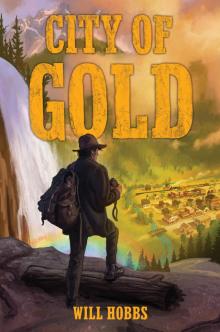 City of Gold
City of Gold Kokopelli's Flute
Kokopelli's Flute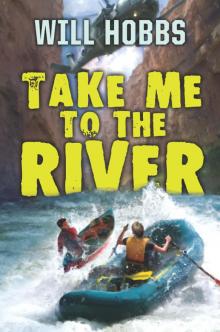 Take Me to the River
Take Me to the River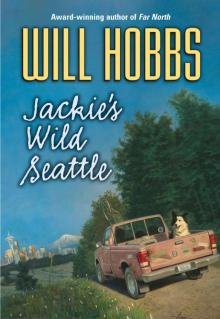 Jackie's Wild Seattle
Jackie's Wild Seattle The Maze
The Maze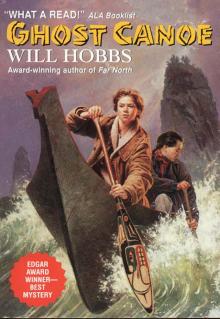 Ghost Canoe
Ghost Canoe Never Say Die
Never Say Die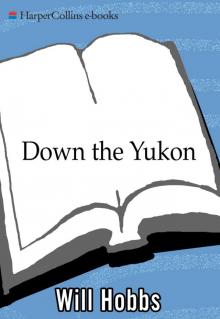 Down the Yukon
Down the Yukon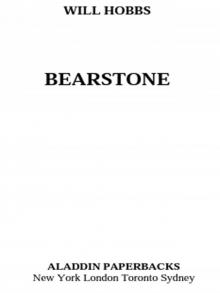 Bearstone
Bearstone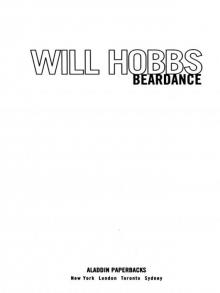 Beardance
Beardance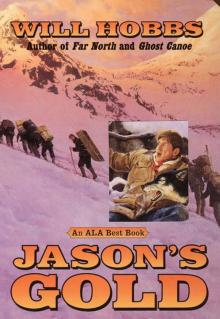 Jason's Gold
Jason's Gold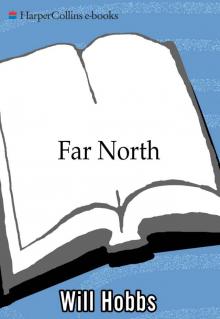 Far North
Far North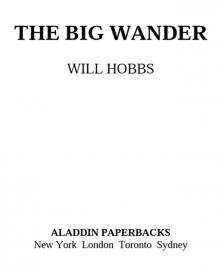 The Big Wander
The Big Wander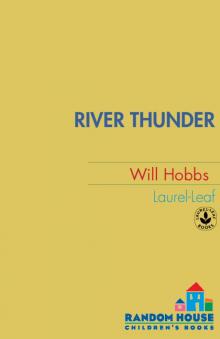 River Thunder
River Thunder Downriver
Downriver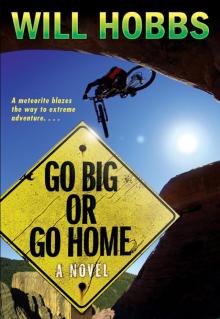 Go Big or Go Home
Go Big or Go Home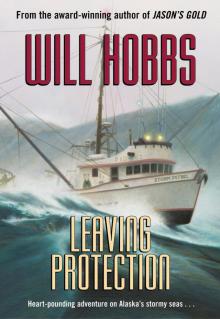 Leaving Protection
Leaving Protection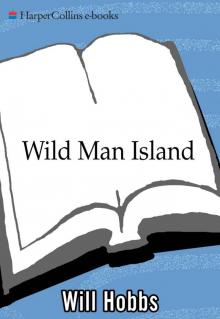 Wild Man Island
Wild Man Island